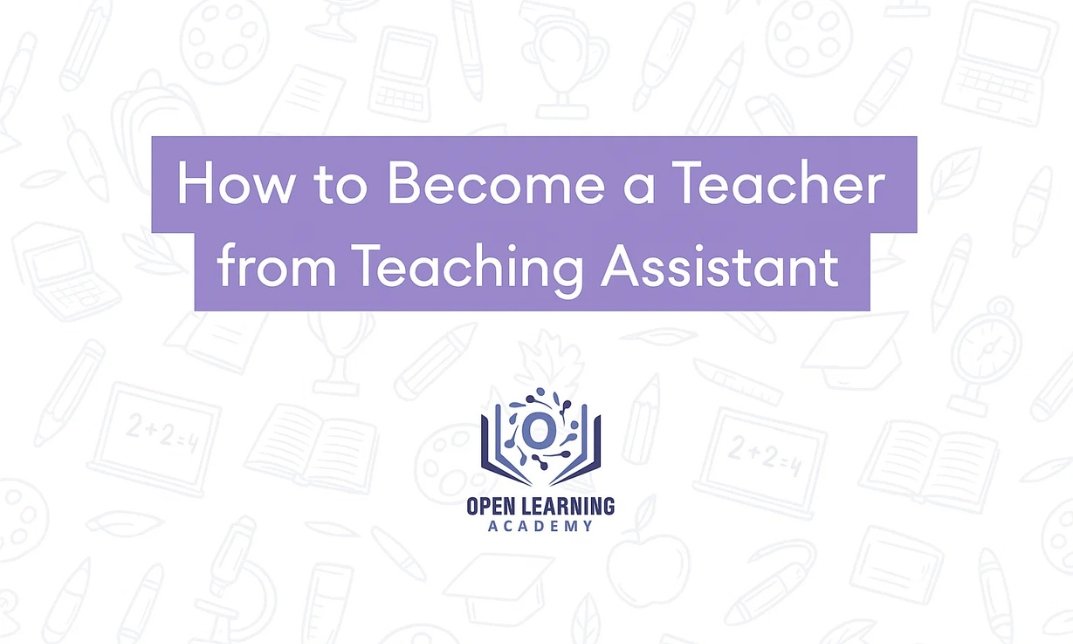No products in the cart.
Yes. A degree can help you land a TA role, but schools still look for GCSE English & Maths (9–4 or equivalent), a clean enhanced DBS, basic safeguarding knowledge, and some classroom experience. So, can I be a teaching assistant with a degree? The short answer is yes—but a degree alone isn’t enough.
Schools want people who bring both education and practical skills. That means you’ll still need to show you have the basics covered, like English and Maths qualifications, a DBS check, and some real-time in a classroom.
The good news? Your degree gives you a strong edge. It shows commitment, academic ability, and subject knowledge. But more importantly, it can open doors to faster progression, like Higher Level Teaching Assistant (HLTA) roles or even teacher training if you decide to go further.
If you love the idea of supporting children, building confidence, and being part of a school team, this could be the right blog for you. And with the right training, you can step into a classroom feeling ready, supported, and full of confidence.
Can I Be a Teaching Assistant With a Degree?

A degree can make your application stronger and give you more confidence when you step into the classroom.
Schools need GCSE English and Maths (9–4 or Functional Skills), plus an enhanced DBS and basic safeguarding to ensure pupil safety. And don’t forget the value of real classroom experience. Even a few mornings of volunteering in a school can help a lot. You get to see what the job is really like, show your commitment, and find out if it feels right for you.
So yes, your degree is a big plus. But when you combine it with the right qualifications, checks, and experience, you become a strong candidate who schools will notice.
What Schools Look For (Simple Checklist)
Basic Qualifications
- GCSE English and Maths (grades 9–4).
- Or an equivalent like Functional Skills.
- These show you can support pupils with reading, writing, and numbers.
Right to Work
- You must have the legal right to work in the UK.
- Simple, but very important!
DBS & Safeguarding
- An enhanced DBS check with the children’s barred list.
- Basic safeguarding knowledge:
- Know who to report to.
- Know how to keep records clear.
Experience & References
- Reliable references from past work or study.
- Even a few mornings volunteering in a school help a lot.
- It shows commitment and gives you something real to talk about in interviews.
The Bonus of a Degree
- Your degree adds confidence and knowledge.
- But when you pair it with checks, skills, and experience, you become the candidate schools want.
Graduate Routes Into a TA Job (Choose Your Path)
Your degree opens several doors. You can volunteer in a school, join a training course, or go for an apprenticeship.
First, you can apply directly and build in a little volunteering. Even a couple of mornings in a local school helps you show real classroom experience alongside your degree. Schools love seeing that mix. You can also fast-track your skills with a Level 2 or Level 3 TA course. These short courses make your CV shine and give you the confidence to step straight into a support role.
Another popular option is a Level 3 apprenticeship. Imagine earning a wage while you train in school—it’s hands-on, paid, and you walk away with a recognised qualification.
And don’t forget about graduate talent pools run by councils and trusts. These are like pipelines designed just for graduates ready to support, grow, and even progress towards teaching.
So yes, your degree matters. But when you pair it with the right training or a slice of school experience, you stand out as a strong, job-ready candidate.
How Your Degree Helps in the Classroom

Your degree isn’t just for your CV—it can make a real difference in class. From subject knowledge to people skills, it gives you extra tools to support children every day.
Subject Strength
- Children love asking questions.
- You can explain tricky ideas in simple words.
- This makes learning fun and less scary for them.
Organisation & Resources
- Your writing and research skills are super useful.
- You can keep notes neat and group work structured.
- Teachers really notice when things feel organised.
People Skills
- Calm behaviour support makes a huge difference.
- Building warm relationships helps children feel safe.
- Good chats with parents and teachers build trust.
Digital Confidence
- You can create slides and tidy resources.
- Help pupils with devices and online learning.
- Schools really value strong digital skills today.
Teaching Assistant Training & CPD for Graduates (Stand Out Fast)
You might be wondering, can I be a teaching assistant with a degree and really stand out? The answer is yes—but the secret is adding the right training.
Start with one short CPD course. Phonics, autism and ADHD awareness, behaviour support, or paediatric first aid all look fantastic on your CV. They also give you practical confidence for the classroom. Then, if you don’t already have school-based training, think about a Level 2 or Level 3 TA qualification. Or, even better, a Level 3 apprenticeship if you like the idea of learning while earning.
Finally, keep a simple CPD log. Just write down what you’ve done and what skills you learned. At the interview, this small step shows schools that you’re serious, organised, and ready to grow. With the right mix of your degree, a little CPD, and a recognised qualification, you’ll move from “graduate” to “job-ready TA” in no time.
To make that journey easier, explore accredited CPD and TA qualifications with Open Learning Academy — designed to help graduates stand out fast.
Graduate Teaching Assistant vs Teaching Assistant (Know the Labels)
It’s easy to get confused by the titles. “Graduate TA” in schools and “Graduate Teaching Assistant” in universities actually mean very different things.
In Schools – “Graduate TA”
- A TA role aimed at people with degrees.
- Often linked to future teacher training routes.
- A mix of classroom support and small extra responsibilities.
- Focus on day-to-day TA skills: small-group work, note-taking, behaviour support.
- It’s a great stepping stone if you want to become a teacher later.
In Universities, “Graduate Teaching Assistant (GTA)”
- A very different role in higher education.
- Usually, for postgraduates, not undergraduates.
- Involves helping with tutorials, marking, and seminars.
- Supports lecturers and research, rather than school-age pupils.
- More academic and subject-focused than classroom-focused.
TA Pay and Hours for Graduates (Friendly Overview)
You might be asking, can I be a teaching assistant with a degree and what about the pay? Let’s make it simple.
Most TA jobs are term-time only. That means your pay is pro-rated and then spread evenly across 12 months. So, you get the same amount each month, even during holidays. Pay itself can vary. It depends on your council’s pay scale, the type of school you work in, and of course, the hours on your contract. This is why it’s important to check the weekly hours and the number of weeks before you accept a role. That way, there are no surprises later. The good news? Your degree may give you confidence to move into higher-point TA roles, or even HLTA positions, a little faster. So yes, the hours and pay need checking carefully—but the career itself offers steady work, growth, and a clear path forward.
Want to dive deeper into salaries? Check out our full guide on how much a teaching assistant earns for a clear breakdown of pay scales, hours, and what affects your income.
CV & Interview Tips for Graduates (Step-by-Step Wins)
Step 1: Lead with your degree.
Put your degree right at the top of your CV. Then add any school hours and one short CPD course, like phonics or behaviour support.
Step 2: Show key skills.
Highlight calm communication, behaviour support, and neat note-taking. These everyday skills make a big difference in the classroom.
Step 3: Keep your CV tidy.
Stick to one page only. Make it clear, simple, and tailored to the job advert. Schools like easy-to-read CVs.
Step 4: Prepare for interviews.
Keep your answers short and friendly. Share examples from your volunteering or study that link directly to helping children.
Step 5: Connect degree + experience.
Show how your degree knowledge and real school practice work together. That mix makes you stand out from other candidates.
From TA to Teacher: Paths You Can Take
First, start by building your school hours and collecting CPD. Once you’ve done that, you can apply for HLTA status. This lets you lead groups and cover classes, which is a brilliant step up.
Next, when you’re ready, consider teacher training. You can choose from a PGCE, a salaried school-based route, or even a teaching apprenticeship. Each path depends on your lifestyle and what fits best. Finally, make sure you keep evidence of your impact. Save examples of lessons supported, progress made, or feedback from teachers. This kind of proof makes future applications much stronger.
So yes, starting as a TA is not the end—it can be the beginning of a full teaching career if that’s your goal.
Teaching Assistant Funding & Costs (Keep It Simple)
Money worries can hold people back, but training as a TA doesn’t need to be expensive. Here’s how it works:
- Apprenticeship = win-win. You train while working, so your course is funded and you still get paid.
- Adult learning courses. Many colleges offer bursaries or fee help if you meet certain conditions. It’s always worth asking.
- Once you’re hired. Schools often pay for extra training like INSET days or short CPD courses. That means you keep learning without spending from your pocket.
The good news? With the right route, you can train, earn, and grow without big upfront costs.
Classroom Experience: How to Get It Quickly
If you’re new, the fastest way to get experience is by volunteering. You don’t need months—just one or two mornings a week for four weeks can make a big difference.
Start small. Ask a local school if you can help with reading or maths groups. Teachers are often happy for the extra support, and children love the extra attention. While you’re there, keep a little log. Write down the hours you do and the tasks you try. Later, you can add this to your CV or share it at interviews.
It’s simple, practical, and shows schools you’re serious about the role. Plus, you’ll quickly feel what being a TA is really like.
Boundaries That Protect Quality (and You)
As a teaching assistant, you play a really important part in the classroom. But the teacher always keeps overall responsibility. That means you can focus on giving support without carrying the whole load.
When it comes to medical tasks or safeguarding, follow the school’s policy every time. These rules are there to protect both you and the children. And if you’re unsure, just ask. Questions show you care and want to get it right.
Confidential information is another big one. Keep it safe, and only share it with the right staff. This builds trust and shows you’re professional.
Boundaries aren’t about stopping you. They give you space to do your job well and keep everyone safe.
Conclusion
So, can I be a teaching assistant with a degree? The answer is yes—but a degree is just the starting point. Schools value your academic background, but they also want to see GCSE English and Maths (or equivalent), safeguarding knowledge, a DBS check, and some real classroom experience. When you combine your degree with these essentials, you become a confident, job-ready candidate who can step into the classroom and make a real difference. And if you decide to go further, your degree can open doors to HLTA roles or even teacher training.
Dreaming of a career in schools?
Join our Teaching Assistant course and learn the skills that schools really value. We’ll guide you step by step, give you practical tips, and help you build real confidence.
FAQs
- Can I be a teaching assistant with a degree?
Yes, you can. A degree can even make your application stronger, but schools also ask for GCSE English and Maths, a DBS check, and some classroom experience.
- Does my degree replace GCSEs?
No. Schools still want to see GCSE English and Maths at grades 9–4, or a recognised equivalent like Functional Skills.
- Do schools prefer graduates?
Sometimes. A degree shows subject knowledge and commitment. But your classroom skills and personality matter just as much.
- Do I need extra training if I already have a degree?
Yes, often. A short CPD course like phonics, behaviour, or SEN support helps you stand out in applications.
- Can a TA role lead to teaching?
Absolutely. Many graduates start as TAs, then move into HLTA or teacher training routes like a PGCE or apprenticeship.




